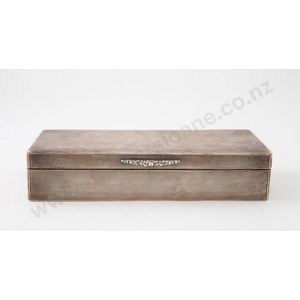Engine-Turned Silver Cigarette/Cigar Box with Laurel Handle
sterling silver rectangular Cigarette/Cigar box, engine turned with applied laurel leaf handle, 20.5 cm wide, marks worn
You must be a subscriber, and be logged in to view price and dealer details.
Subscribe Now to view actual auction price for this item
When you subscribe, you have the option of setting the currency in which to display prices to $Au, $US, $NZ or Stg.
This item has been sold, and the description, image and price are for reference purposes only.
- Sterling Silver - Sterling silver is a mixture of 92.5% pure silver and 7.5% of another metal, usually copper. Fine silver is 99.9% pure silver, and is relatively soft and the addition of the very small amount of copper gives the metal enough strength and hardness to be worked into jewellery, decorative and household objects.
- Engine Turned - Engine turning is a decorative technique used on metal surfaces to create intricate curving or geometric pattern. The process involves cutting a series of lines into the surface of the metal using a rose engine or decoration lathe which rotates the metal as it cuts, allowing the operator to create a repeating pattern that covers the entire surface. The resulting surface has a shimmering, reflective quality that is often described as "engine turned." Where an engine turned item has been enamelled, the term used to describe the decoration is usually guilloche.
Engine turning was originally developed to decorate metal objects such as firearms, scientific instruments, and other metal objects that required precise and elegant design. - Laurel Leaf - The use of the laurel leaf as a decorative element can be traced back to ancient Greece and Rome, where it was closely associated with victory and honour. In these cultures, the laurel was a sacred tree that was dedicated to the god Apollo and was believed to have protective and healing properties.
In ancient Greece, the laurel wreath was awarded to victors in athletic competitions, such as the Olympic Games, as a symbol of their achievement. The wreath was also associated with academic achievement, and was often worn by scholars and poets. The Greeks also used the laurel leaf as a symbol of victory in war, and it was often depicted in artwork alongside images of triumphant warriors and heroes.
The Romans continued this tradition, and the laurel wreath became a symbol of the highest military honor, the triumph, awarded to victorious generals. The wreath was also used to crown emperors and other important officials, and was often depicted in Roman art and architecture as a symbol of power and authority.
The laurel leaf is still used as a symbol of achievement, success, and excellence, and is frequently used in logos, emblems, and other branding materials. Its association with victory and honour has made it a popular choice for awards, medals, and other forms of recognition.
This item has been included into following indexes:
